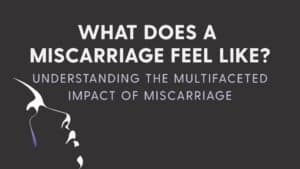Miscarriage is defined as a pregnancy that ends before the 20th week, while the baby is still too young to survive outside the womb. Causes of miscarriage can include problems with the mother’s uterus or placenta, or abnormalities in the baby’s development. In most cases, the cause of miscarriage remains unknown.
Though one in five pregnancies end in miscarriage, having a miscarriage does not make a woman more likely to miscarry in the future.
Some people use the word “miscarriage” to describe a stillbirth. A stillbirth is the birth of a fully formed baby who is not alive. Problems with the position of the baby while in the womb, the umbilical cord or congenital defects in the baby may contribute to stillbirth, but — as with miscarriage — the cause of stillbirth is often unknown.
Medical supervision throughout pregnancy is key to a healthy birth. Additionally, there are certain symptoms that may be indicators for miscarriage; any pregnant woman who experiences these warning signs should consult a physician immediately:
- Heavy vaginal bleeding
- Passing blood clots
- Moderate or severe cramping
- Unusual vaginal discharge
- Chills or fever of 100.4 degrees Fahrenheit or higher
The physical and emotional pain of miscarriage make a woman more dependent on family and friends. It’s helpful if she and her support group know what to expect following a miscarriage.
Physical Effects include:
- Vaginal bleeding for about a week, often followed by a time of lighter bleeding or spotting
- Pain similar to menstrual cramps
- Breast sensitivity
Emotional effects of miscarriage vary among women and often take longer to heal than their physical counterparts. It’s common to experience extreme sadness, anger, guilt and anxiety about future pregnancies. There is no “typical” timeframe for emotional recovery; every woman experiences the grieving process in her own way and travels the road to healing at her own pace. While it’s important to allow time and personal “space” for grieving, if the grief becomes too overwhelming — leading to a more serious episode of depression and despondency — it may be necessary to get professional help.
Fathers, too, are profoundly affected by the loss of a child. Unfortunately, a common misconception regarding miscarriage and stillbirth is that only the mother is affected. Women often feel more freedom to cry and express their grief, whereas men tend to feel pressure to “remain strong” and may busy themselves with work or other activities in an effort to deal with their grief. Because men and women typically express their emotions and process their grief differently, it’s important for both parents to communicate their feelings to one another, helping to avoid the added pain of misunderstandings.















